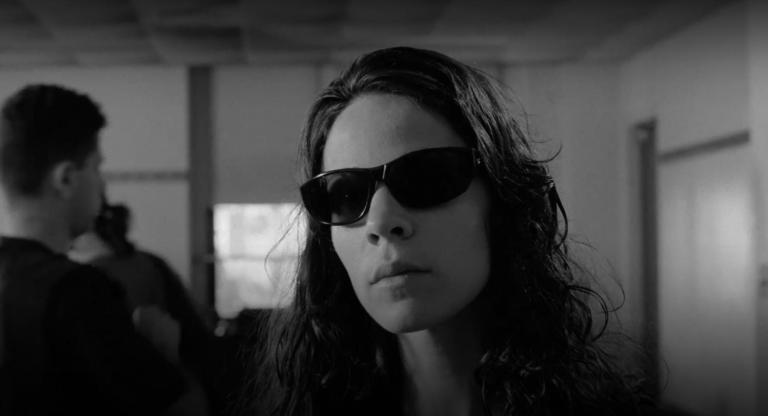Nina Menkes’s first feature film Magdalena Viraga (1986) is a staple of feminist cinema, an experimental study of modern womanhood and sexuality. The film centers around a prostitute, Ida (Tinka Menkes), who has been imprisoned for the murder of her pimp. The secrets of the crime are revealed achronologically through striking, locked compositions and dialogue loaded with potent symbolism.
Ida is a passive and emotionless character, moved only by the force of others. Her speech is stilted poetry that she rarely resolves, either because her interior world is, as she puts it, “locked up” or because her clients leave her mid-sentence. Like Ida, the film itself moves from one suspended moment to another, lingering in frozen tableaux vivants.
The film’s male characters, while more active than the women, are also moved by forces outside of themselves—a sexual impulse, a coming train, or the law. Mysterious obligations compel them into and out of the frame. As Ida notes of a john, “He comes and says, ‘I’ve got to go.’” The shadow of the film’s central question, the truth of the murder, is cast in every corner. In scenes between Ida and a fellow prostitute (Nora Bendich), there is an empty third chair, a static symbol that, in Menkes’s hands, evokes the same sense of absence and anticipation as an action-packed whodunnit.
Filmed on location in the seedy underbelly of East Los Angeles at the height of urban dilapidation, Magdalena Viraga provides a refreshing commentary on the limitations of the sexual revolution and the adverse consequences of its advances. Menkes sees capitalism manifesting in an increasingly transactional relationship to sex, a theme to which she returns in her 2022 documentary Brainwashed: Sex-Camera-Power. The resulting alienation is evinced in Magdalena Viraga through a frigid protagonist, a fixed camera, and an unfeeling world.
Magdalena Viraga screens through March 10 at BAM in a new digital restoration as part of the series “Cinema is Sorcery: The Films of Nina Menkes.”




